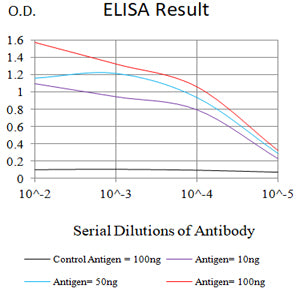
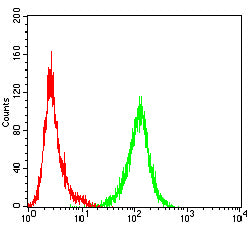
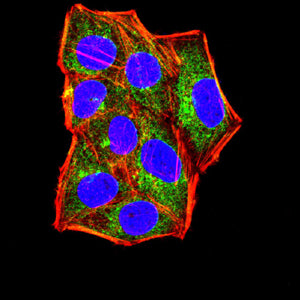
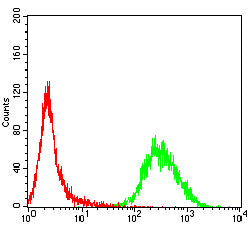
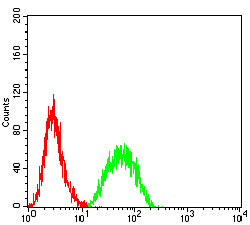
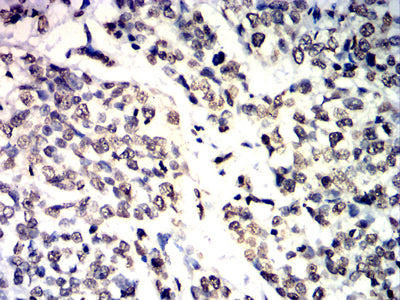
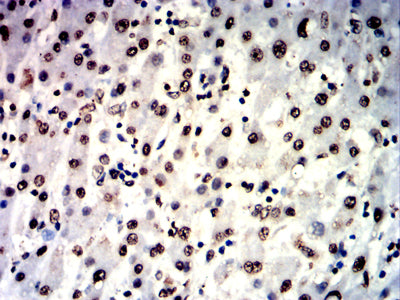
| WB | 咨询技术 | Human,Mouse,Rat |
| IF | 咨询技术 | Human,Mouse,Rat |
| IHC | 1/200 - 1/1000 | Human,Mouse,Rat |
| ICC | 1/200 - 1/1000 | Human,Mouse,Rat |
| FCM | 1/200 - 1/400 | Human,Mouse,Rat |
| Elisa | 1/10000 | Human,Mouse,Rat |
| Aliases | IL-1; IL1F2; IL1beta; IL1-BETA |
| Entrez GeneID | 3553 |
| clone | 6F12D5 |
| WB Predicted band size | 30.7kDa |
| Host/Isotype | Mouse IgG1 |
| Antibody Type | Primary antibody |
| Storage | Store at 4°C short term. Aliquot and store at -20°C long term. Avoid freeze/thaw cycles. |
| Species Reactivity | Human |
| Immunogen | Purified recombinant fragment of human IL1B (AA: 117-269) expressed in E. Coli. |
| Formulation | Purified antibody in PBS with 0.05% sodium azide |
+ +
以下是关于IL-1β抗体的3篇代表性文献的简要信息:
1. **文献名称**:*Targeting interleukin-1β in autoinflammatory diseases*
**作者**:Dinarello, C.A.
**摘要**:探讨IL-1β抗体在自身炎症性疾病(如类风湿性关节炎和痛风)中的治疗作用,强调其通过阻断IL-1β信号通路减少炎症反应和病理损伤的机制。
2. **文献名称**:*Anti-inflammatory therapy with canakinumab for atherosclerotic disease*
**作者**:Ridker, P.M. et al.
**摘要**:基于CANTOS临床试验,研究IL-1β单抗Canakinumab对动脉粥样硬化患者心血管事件的干预效果,证实其通过抑制炎症降低心梗和中风风险。
3. **文献名称**:*IL-1β blockade reduces tumor progression and angiogenesis in a murine model of breast cancer*
**作者**:Apte, R.N. et al.
**摘要**:通过动物模型证明抑制IL-1β可减少乳腺癌肿瘤生长和血管生成,机制涉及调控肿瘤微环境中免疫细胞浸润及促炎因子表达。
4. **文献名称**:*IL-1β inhibition in COVID-19: balancing inflammatory response*
**作者**:Cavalli, G. et al.
**摘要**:讨论IL-1β抗体在重症COVID-19患者中的应用潜力,显示其可能通过缓解细胞因子风暴改善临床结局,但需权衡免疫抑制风险。
以上文献覆盖了IL-1β抗体在疾病治疗、机制研究和新兴领域(如COVID-19)中的应用,反映了其在基础与临床研究中的重要性。
**Background of IL-1β Antibodies**
Interleukin-1 beta (IL-1β) is a pro-inflammatory cytokine critical in mediating immune and inflammatory responses. Produced primarily by macrophages, IL-1β is generated through inflammasome-mediated cleavage of its inactive precursor, pro-IL-1β, and plays a key role in host defense, autoimmune diseases, and chronic inflammation. Dysregulated IL-1β signaling is implicated in conditions like rheumatoid arthritis, gout, and autoinflammatory syndromes (e.g., cryopyrin-associated periodic syndromes).
IL-1β antibodies are therapeutic agents designed to neutralize IL-1β activity, blocking its interaction with the IL-1 receptor (IL-1R). This inhibition reduces downstream inflammatory pathways, offering clinical benefits in diseases driven by excessive IL-1β. Monoclonal antibodies (e.g., canakinumab) and receptor antagonists (e.g., anakinra) are common biologics targeting this pathway. Canakinumab, a high-affinity human monoclonal antibody, specifically binds IL-1β, preventing receptor engagement and suppressing inflammation.
Research continues to explore IL-1β antibodies in broader applications, including atherosclerosis and cancer, where inflammation contributes to pathogenesis. Despite their efficacy, challenges include cost, immunogenicity risks, and patient-specific variability in response. Overall, IL-1β antibodies represent a cornerstone in biologics for inflammatory diseases, highlighting the importance of cytokine-targeted therapies in modern medicine.
×